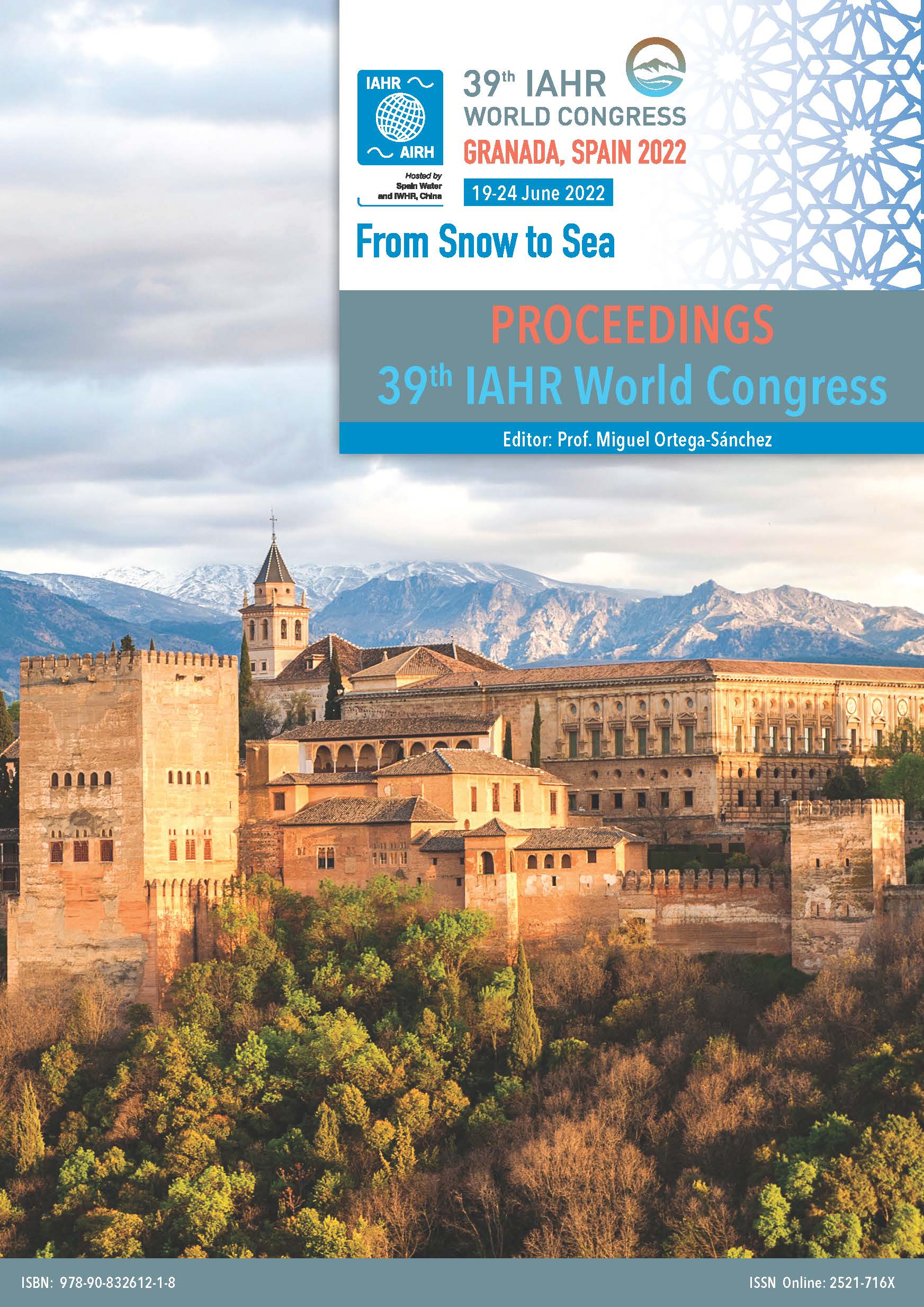IAHR Document Library

Proceedings of the 39th IAHR World Congress (Granada, 2022)
- ISSN Online: 2521-716X
- ISSN Print: 2521-7119
- ISBN: 978-90-832612-1-8
- Publisher: International Association for Hydro-Environment Engineering and Research (IAHR)
- Editor(s): Prof. Miguel Ortega-Sánchez, University of Granada, Spain
- Related: 39th IAHR World Congress
Innovative approaches to water management challenges are needed more than ever to ensure sustainable and resilient societies worldwide. Under the overall theme "From Snow to Sea", the 39th IAHR World Congress focused on the importance of an integrated and intelligent approach to managing the whole water cycle to address the global challenges people and the environment face. The Congress highlighted IAHR's commitment to the critical role that sound understanding of the water cycle plays in achieving the Sustainable Development Goals (SDGs) and Agenda 2030.
Revision process
The papers included in this volume were part of the 39th IAHR World Congress which took place in Granada, Spain, from 19 to 24 June 2022. Papers were selected and subjected to review by the Editor and the International Scientific Committee and followed a revision process with the following steps: (1) The committees involved in the organisation of the Congress established a set of technical criteria for the committee in charge of the revision. (2) Submitted papers were sent to one or two experts in the field. (3) Authors were asked to include the necessary amendments and follow the reviewers´ comments, and (4) Their work was reviewed until the final version was approved by the Editor.
Ethical guidelines and Code of Conduct
In addition to the technical criteria, IAHR publications follow the Ethical Guidelines and Code of Conduct provided by the Committee of Publication Ethics (COPE). A Publication Ethics and a Publication Malpractice statement are publicly available throughout the entire review process.
Besides the peer-reviewed papers, this volume contains the reports of the High-Level Panels.
The 39th IAHR World Congress proceedings are long-term preserved following the IAHR Policy of digital preservation archives.
Committees
The International Scientific Committee (ISC) and the Advisory Board provide counsel and support to the Congress Organising Group (COG) for the scientific and technical coordination of the congress.
Content
Theme 1: Human-water relationships (42)
Theme 2: Snow, river and sediment management (132)
Theme 3: Environmental hydraulics and urban water cycle (129)
Theme 4: Hydraulic structures (108)
Theme 5: Water resources management, valuing and resilience (109)
Theme 6: Computational and experimental methods (256)
Theme 7: Coasts, estuaries, shelves and seas (81)
Theme 8: Extreme events: from droughts to floods (177)
High-level panels reports
From Snow to Sea — Managing Enclosed Seas Under Climate Threat
Water Governance
Artificial Intelligence
Nature-based Solutions and Ecohydraulics
Keynotes
Coastal Resilience in a Changing Climate: the CoastPredict Solution
Water Challenges in Spain
Machine Learning for Scientific Discovery, with Examples in Fluid Mechanics
Special sessions
Reservoir sedimentation in semi-arid and arid environments. A comparative analysis from vulnerability of climate change in sensitive environments
Integrating ecohydraulics and ecohydrology in environmental flow assessments
Environmental hydraulics related to aquaculture
Ecohydraulics 2021: Novel methods to investigate flow-biota interactions numerically, in the lab and in the field
Green infrastructure and sustainable urban drainage systems
Implementing Nature Based Solutions – bringing science to practice
The shallow water model intercomparison session: Benchmarking overland flow simulations
Copyright: @2022 IAHR
| ID | Title | Authors | Year |
|---|---|---|---|
| 21551 | An Integrated Model for Runoff, Flow, and Asset Degradation in Railway Drainage Systems |
Yiqi Wu; Simon Tait; Andrew Nichols
|
2022 |
| 21552 | Evaluation of River Flow Response to Rainfall with Consideration of Climate Change in the Yamato River Basin |
Daiki Omori; Akira Kurihara; Koji Tanaka; Yutaka Oyagi
|
2022 |
| 21553 | Dimensionless Analysis of Dam Breach Flood Wave Attenuation Along a River |
Francesco Macchione; Andrea Antonella Graziano; Domenico Ferraro
|
2022 |
| 21554 | The Inclusion of “Associated Events” in Basin Scale Flood Modeling: The Case of Clogging and Breakage at a Bridge and Its Consequences on Flood Dynamics |
Margherita Lombardo; Francesco Macchione
|
2022 |
| 21555 | Effects of Anthropic Changes on the Propagation of the Gleno Dam Break Wave in the Valle Camonica Floodplain |
Gabriele Farina; Riccardo Bonomelli; Marco Pilotti
|
2022 |
| 21556 | Assessment of Flood Hazard Caused by Overtopping of a Dam |
Kutay Yilmaz; Cagri Hasan Karaman
|
2022 |
| 21557 | A New European Coastal Storm Impact Database of Resources: The ECFAS Effort |
Paola Souto Ceccon; Enrico Duo; Tomas Fernandez Montablanc; Juan Montes; Paolo Ciavola; Clara Armaroli
|
2022 |
| 21558 | The Movida Project to Support the Update of Flood Risk Maps in the Po River District: Methodology for Flood Damage Assessment |
Francesco Ballio; Clara Armaroli; Marcello Arosio; Chiara Arrighi; Enrico Borgogno Mondino; Francesca Carisi; Fabio Castelli; Paolo Ciavola; Silvia De Biaggi; Gianni Di Pietro; Alessio Domeneghetti; Enrico Duo; Gabriele Farina; Alice Gallazzi; Federica Ghilardi; Riccardo Giusti; Mohammed Hammouti; Fabio Luino; Mario Martina; Daniela Molinari; Beatrice Monteleone; Natasha Petruccelli; Marco Pilotti; Anna Rita Scorzini; Tommaso Simonelli; Simone Sterlacchini; Laura Turconi; Cesare Vasini; Marco Zazzeri; Laura Zoppi
|
2022 |
| 21559 | Machine Learning for Data Driven Management of UK Railway Drainage Infrastructure |
Ehsan Kazemi; Yiqi Wu; Andrew Nichols; Simon Tait; Jamil Raja
|
2022 |
| 21560 | Phenomenological Differences Between Snow-Influenced and Rainfall-Driven Floods in Northern Iberian Peninsula |
Javier Montes; Maria Bermudez; Jeronimo Puertas; Manuel Alvarez
|
2022 |